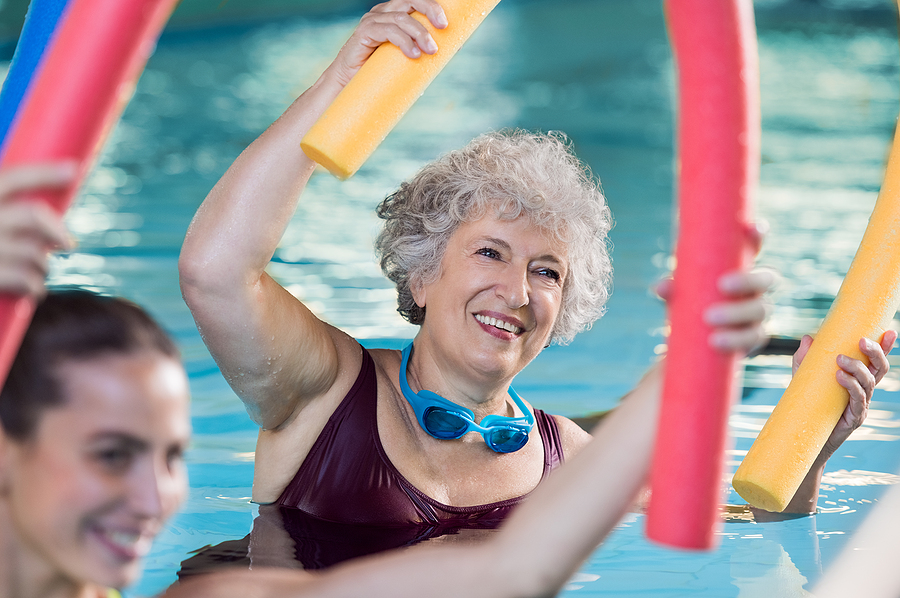Staying active is important at all stages of life, but it is especially important for seniors. The body needs regular exercise and movement to stay strong. One of the most beneficial forms of movement for seniors is swimming.
The health benefits of swimming for seniors are significant, and seniors of all abilities can enjoy the rewards this form of exercise brings.
Types of Swimming and Water Exercises
One of the major upsides of swimming is that there are many variations to explore. Active seniors can swim laps and get in a real cardio workout, and seniors with more limited mobility can gently exercise their muscles and joints.
There are four primary types of swimming and water exercises.
- Water aerobics is a popular form of cardio and strength training for seniors.
- Basic swimming, like swimming laps or simply treading water, is another popular and straightforward form of swimming. Seniors can easily choose the level of exertion that works best for them.
- Resistance exercises, like arm curls and leg swings, often done with foam weights, are a great way to get a challenging yet gentle workout.
- Relaxation exercises, like water yoga, pilates, and even meditation, can be a stress reliever that is a great benefit for seniors.
How Does Swimming Benefit the Elderly?
According to the CDC, there are many benefits of swimming for seniors. Swimming is one of the most gentle and accessible forms of activity, making it a perfect wellness practice for those with mobility challenges.
Swimming Is Great For The Heart
One of the key benefits of swimming for seniors is the benefit to heart health. Swimming is an effective way to improve endurance and keep the heart strong. Good cardiovascular health also leads to health benefits in other parts of the body, including:
- Lower blood pressure
- Lower risk of lung disease
- Improved circulation
- Lower risk of asthma
- Reduced joint pain
For seniors with limited mobility, exercising the heart through activities can be challenging. Water offers the support seniors often need to feel steady while exercising and staying active.
Swimming Benefits The Joints
As seniors age, it is not uncommon to experience joint stiffness or pain. Movement can improve joint health, but it can be a challenge for seniors with limited mobility or fighting through the pain.
Movement in the water is gentle on the joints because it reduces the pressure of body weight. Joint health is one of the significant health benefits of swimming for seniors and may even be recommended by a doctor or therapist.
Swimming Improves Muscle Strength
It can sometimes be difficult for seniors to maintain muscle strength as they age. Maintaining muscle strength is key for seniors to keep their full mobility and avoid falls. Lifting weights may become more difficult or painful, so swimming is a great alternative. Swimming offers resistance training that is less harsh on the joints and tendons.
Swimming Increases Flexibility
For seniors in later years of retirement, flexibility can become more limited. Lack of flexibility can make everyday tasks much harder, like driving, doing chores, and even walking. Improved flexibility is one of the incidental health benefits of swimming for seniors.
Swimming improves flexibility without the risk of straining muscles and tendons. Improved flexibility also makes it easier to stay active and less likely that seniors will suffer from accidents like falls.
Swimming Improves Mental Health
Swimming is often associated with physical health benefits, but one of the biggest benefits of swimming for seniors is improving mental health. Swimming naturally reduces stress, boosts mood, and enhances confidence. In addition, swimming can also be done in groups or pairs for the added benefit of social interaction.
How Often Should Seniors Swim?
Like most exercise recommendations, how often a senior should swim depends on their circumstances. Despite the numerous health benefits of swimming for seniors, swimming every day or multiple times a day may be too much.
As a general rule of thumb, seniors should swim two to four times a week and supplement with other forms of activity. Seniors should work with their doctor and swim instructor to determine how often they should swim.
Is Swimming Better than Other Forms of Exercise?
Given the many benefits of swimming, it is generally considered one of the best forms of exercise for seniors. Swimming exercises the entire body in one activity and strengthens the muscles, joints, and heart at the same time.
It is one of the most efficient and gentle forms of exercise, but that doesn’t mean it is appropriate for all seniors. Some seniors may not react well to being in the water for extended periods.
In addition, seniors who are not skilled swimmers need to take extra care to ensure they are safe while swimming. Seek advice from a doctor and work with a swim instructor to develop the best routine for you.

